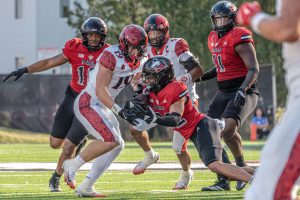The group effort
February 19, 2004
“If you don’t turn out to be a genius, I will never speak to you again,” said Stella Adler, played by Tracy Kratz during Saturday night’s performance of “The Group!”
There were some large shoes to fill for the 18 NIU students and faculty members who performed Ronald Rand’s play in the Stevens Building’s Corner Theatre. “The Group!” celebrates a group of actors that broke away from accepted theater in 1931 to form a company that focused on the elimination of over-acting.
-The actors in “The Group!” put themselves in a position of scrutiny, asking the audience to scrutinize every line and motion and weigh its sincerity.
As the play progressed, the audience slowly was introduced to the 15 members of the group. Attempting to keep all of the characters straight became a daunting task, as side plots were introduced only to be dropped within a few scenes. Much of the play seemed to be dead ends leading the audience on with promises of a love affair between Clifford Odets (Michael Rantis), and Phoebe Brand (Allison Franz). The love affair between the young playwright and actress dies quickly as Odets fails to bring up the topic again. Brand is seen on the arm of Morris Carnovsky (Terrence Meagher) within a few scenes.
In a play that calls for its audience to demand nothing but the best from American theater, the writing must complement the acting.
Tom Brown’s performance as the young Lee Strasberg may have met the mark, but as a whole, the play could not support its lofty goals. Noah Fried played Harold Clurman with exuberance. Fried’s energetic and animated expressions were portrayed with exaggerated gestures and a faltering Jewish accent.
One of the last scenes in the play flashes forward to the dedication of a theater to Clurman in 1979. The older Clurman (Ronald Rand) and Strasberg (assistant professor Phil Timberlake) drop the effects used by the younger actors.
A hardened Strasberg becomes soft in the closing scenes. Characters change without reason or warning, severing the tenuous connection the audience had made to their exaggerated personas.
“Theater is my home, and now I don’t even recognize it,” Fried said during the play, and he shouldn’t recognize it in a play that caters to a cliche and mimics acting more than it imitates life.
“We’ll be the best goddamn fools this world’s ever seen,” Katz said during a point of heightened exuberance.
The actors cannot be completely blamed for over-acting lines that are already over the top. Rand’s adaptation of his one-man act fails to bring out the lives of his heroes and instead resurrects a model for overacting.






